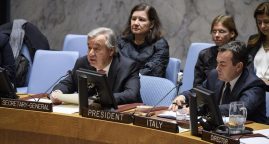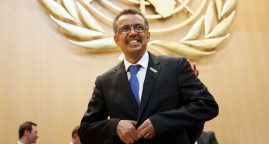War crimes committed by all parties in battle for Aleppo
Article published on UN website on 03/01/2017
The battle late last year for control over Syria’s war-ravaged Aleppo was a stage of unrelenting violence, with civilians on both sides falling victim to war crimes committed by all parties, read a report issued today by the United Nations-mandated Independent International Commission of Inquiry on Syria.
The report documents brutal tactics employed by the parties to the conflict in the country as they engaged in the decisive battle for the once iconic city between July and December 2016, resulting in unparalleled suffering for Syrian men, women and children.
“The violence in Aleppo documented in our report should focus the international community on the continued, cynical disregard for the laws of war by the warring parties in Syria,” said Paulo Pinheiro, the Chair of the three-member Commission, which was mandated by the UN Human Rights Council.
“The deliberate targeting of civilians has resulted in the immense loss of human life, including hundreds of children,” he added.
The report notes that the siege-like tactics employed by pro-Government forces in eastern Aleppo last year trapped civilians without adequate food or medical supplies, and that between July and December, Syrian and Russian forces carried out daily air strikes, claiming hundreds of lives and reducing hospitals, schools and markets to rubble.
It adds that Syrian forces also used chlorine bombs – a chemical agent prohibited under international law – in residential areas, resulting in hundreds of civilian casualties. The Commission also notes that it received reports of use of cluster munitions in densely populated areas.
Furthermore, by late December, when pro-Government forces on the ground took control over eastern Aleppo, no functioning hospitals remained.
The intentional targeting of these medical facilities amounted to war crimes, the Commission concludes.
Attack on UN/Syrian Arab Red Crescent humanitarian convoy
In the course of its investigations, the Commission also examined an attack on a UN/Syrian Arab Red Crescent humanitarian convoy in Orum al-Kubra in Aleppo’s countryside by the Syrian Air Force. The attack killed 14 aid workers, destroyed 17 trucks carrying aid supplies, and led to the suspension of all humanitarian aid in the country.
“Under no circumstances can humanitarian aid workers be targeted,” underscored Commissioner Carla del Ponte, adding: “A deliberate attack against them such as the one that took place in Orum al-Kubra amounts to war crimes and those responsible must be held accountable for their actions.”
Indiscriminate attacks by armed groups
Further in the report, the Commission also notes that armed groups indiscriminately shelled civilian-inhabited areas of western Aleppo with improvised weapons, such as rocket-assisted munitions and mortars, resulting in extensive civilian casualties. A number of these attacks were carried out without a clear military target and had no other purpose than to terrorise the civilian population.
The report also states that in some districts, armed groups shot at civilians to prevent them from leaving, effectively using them as human shields.
It also notes that pro-Government forces on the ground, composed mostly of Syrian and foreign militias, executed hors de combat fighters and perceived opposition supporters, including family members of fighters.
Forced displacement of civilians
The 37-page document reveals that the eastern Aleppo evacuation agreement forced thousands of civilians – despite a lack of military necessity or deference to the choice of affected individuals – to move to Government-controlled western Aleppo whilst others were taken to Idlib where they are once more living under bombardments.
“Some of these agreements amount to forced displacement. It is imperative that the parties refrain from similar future agreements and provide the conditions for the safe return of those who wish to go back to their homes in eastern Aleppo”, said Commissioner Karen AbuZayd.
The Independent International Commission of Inquiry on Syria was established by the UN Human Rights Council to investigate and record all violations of international law since March 2011.
The report is based on 291 interviews, including with residents of Aleppo, and the review of satellite imagery, photographs, videos and medical records. It is scheduled to be presented to current session of the Council on 14 March during an interactive dialogue.
Related Articles
World community has ‘collective responsibility’ to stop human trafficking, support victims
11/21/2017. Slavery and other such egregious abuses of human rights have no place in the 21st century
Tedros Adhanom Ghebreyesus: Ethiopian wins top WHO job
05/23/2017. Tedros Adhanom Ghebreyesus from Ethiopia will be the next director general of the World Health Organization (WHO).
AB Gallagher on Holy See’s action to protect Christians and other minorities
05/22/2017. The Holy See’s ‘foreign minister’, Archbishop Paul Gallagher full statement






